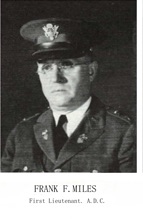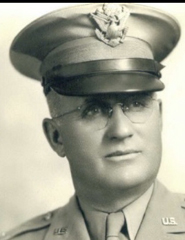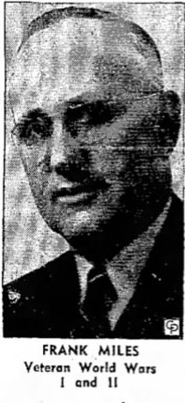The Mason City Globe-Gazette, Friday, January 2, 1942
Except for Mother, All of Frank Miles Family Is in Army
DES MOINES, (AP)—Except for mother, the whole Frank Miles family of Des Moines is in the army now.
Capt. Frank Miles, state selective service official and editor of the Iowa Legionaire, disclosed the enlistment of his second son, William B., 18, in the army air corps.
Frank Miles Jr., 20, became an army aviation cadet the day war was declared. Captain Miles has no other children.
William was center on the Drake University freshman team last fall. On Sept. 5, he played center on the west team in the East-West All-Star Iowa high school football game. As center and captain of the Roosevelt high team here in 1940, he received All-State recognition.
![]()
Tribute Pages on this website for his two sons:
The Daily Times (Davenport, Iowa), Wednesday, Aug. 9, 1944
Frank Miles Off to War Zones as Correspondent for the Daily Times
DES MOINES—(IDPA)—Frank Miles, widely known Iowa newspaperman-lecturer-Legionaire, has packed his traveling bag for a tour of the world’s battlefronts and accepted the task of becoming a Daily Times war correspondent.
It’s the same Major Frank, who until recently was public relations director of state selective headquarters and editor of the Iowa Legionaire. His military title became a temporary casualty when he was placed on inactive duty at his request in order to accept the correspondent assignment.
Born, reared and having spent almost all of his life in this state, Miles became almost as much an Iowa “institution” as the Iowa capitol and is only slightly less well known.
Miles will bring intimate, human interest messages about Iowans overseas, what they are thinking, what they are doing, as only an Iowan can write it. It may be that he will write about that neighbor boy, you know, who donned an army uniform to fight in Italy, or the WAC, who lived around the corner, now in England.
He has been accredited as a war correspondent overseas for the American Legion magazine and the National Legionaire, both of Indianapolis and New York. His travels will take him to the African, European and Pacific theaters.
Muscatine Journal and News-Tribune, August 8, 1944 (excerpt)
He has a son, First Lt. Frank Miles, Jr., 23, who is a bombardier in the army air corps. A younger son, William, 21, a second lieutenant and Liberator pilot, was killed in action May 17, and is buried at Bari, Italy. It is possible that the war correspondent will meet his namesake overseas and visit the grave of the younger son.
Because of his writing talent, service in both army and navy, national Legion officials honored Miles by giving him the overseas assignment. These elements, plus his Iowa background, add to a long, impressive list of qualifications as a war correspondent. He expects to be gone a year or more.
Miles has traveled extensively in 41 foreign countries. For 15 years he has written the “running story,” as a service to working newspapermen, at American Legion national conventions, a task requiring quick thinking, familiarity with convention detail and rapid, accurate writing.
He has visited every state in the Union and has a wide acquaintance both within and without Iowa. During National Guard days, he served as aide to Maj. Gen. Mathew A. Tinley. Miles has made 5,000 platform addresses and 1,000 radio talks.
He was born in Fort Madison, became an LLB at Drake University in 1910, served as a reporter on Des Moines newspapers, as city editor of the old Des Moines Capital and an interval as City Treasurer of Des Moines. He was admitted to the Iowa bar in 1916. Miles has held a variety of public relations assignments and at one time traveled extensively as a freelance writer.
A man of quick step and animated speech, Miles bore a happy, newspaperman’s smile before leaving Des Moines as he contemplated the prospect of a writing assignment of almost “dream” proportions and of seeing something of the war at first hand.
![]()
Carroll Daily Times Herald, August 20, 1945
[excerpt]
When war’s end came, Miles was in West Helena, Ark., making the acquaintance of his 10-month-old grandson, William Baker Miles, jr., whose father, Lieutenant William B. Miles, a first Liberator pilot, was killed in action over Elba May 17, 1944.
* * *
“I didn’t feel like celebrating,” Miles said. “I thanked God the war was over and that the killing and maiming of our boys had ended. I prayed that out of this would come a lasting peace.”
Miles, who resumes duties as editor of The Iowa Legionaire September 1, believes Hitler is dead:
“There was not a Chinaman’s chance that he flew out of Berlin,” he explained. “The Russians surrounded the city from one side and the American and British forces from the other. If he is alive, he must live like a snake the rest of his life.”
German Air Marshal Hermann Goering, Miles describes as the “most diabolical character” he met covering the war.
“If they don’t hang him, the war is lost,” he declared.
The most horrible sights of the war, which he witnessed were German concentration and prisoner of war camps. He came upon the smoking ruins of a mess hall of a camp for political prisoners near Leipzig, Germany, which the nazis had soaked with inflammable liquids and set afire with hand grenades. Those escaping were cut down by bullets from SS men or Hitler youths. Surviving that, they were electrocuted on barbed wire surrounding the enclosure.
“The Germans had everything but character,” he said. “I blame the whole German people for the war. If they did not know what was going on, they are guilty. If they did not know, they are incapable of self-government. I want no softening of Germany.”
He said that he had found that, while the Germans systematically starved if they did not torture all prisoners, the nazis in American prisoner of war camps were, without exception, well treated.
“All the German Civilians that I saw were well fed and clothed,” he said.
Berchtesgaden, setting of Hitler’s mountain chalet in the Bavarian Alps, he said, was the most beautiful spot he ever visited. From the ruins, Miles took as a souvenir a heavy blackout curtain, which fitted over a window.
Looking fit, Miles weighed only two pounds less when he returned than when he flew away from the United States, August 9, 1944. In addition to air miles, he traversed thousands of other miles in hitch-hiking, jeeping, rides in rickshaws, ox-carts, horse-drawn wagons, and trucks. He returned with his trusty sleeping sack in which he dozed in fox-holes, dugouts, forward command posts, cellars, haystacks, trailers, trucks and barns. Often he went to bed with wet feet but he never suffered a head cold.
Dozens of narrow escapes included one in Italy when he was pinned beneath a tank, target of German mortar fire. Everywhere he went he found Iowans. He me one under that tank.
“I don’t see how the United States could have won the war without them,” he explained. “It was amazing from the Azores to Casablanca, clear back to Honolulu—everywhere I met seven or eight soldiers, there always was one from Iowa.”
Readers of his Iowa Daily Press Association (IDPA) stories wrote him at 300 letters. It was nothing uncommon for an Iowa GI upon introduction to pull from his pockets a clipping of one of these articles from one of the Iowa papers in which it had appeared.
![]()



